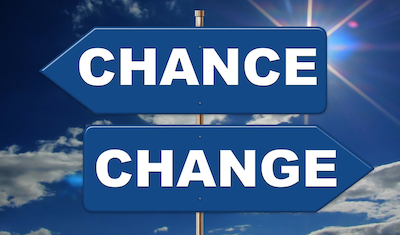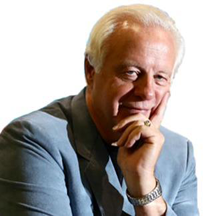Does managing change have to be slow and methodical?
By Dave Kahle
“I don’t want to ask my team to make too many changes at once. We need to manage change slowly and methodically.”
 I have heard words to that effect from a VP of Sales or a CEO dozens of times. Typically, the specifics have to do with changes in the sales force, because that is the world in which I practice, but the sentiment applies to every job title. That idea ranks up there with some of the most destructive myths in business.
I have heard words to that effect from a VP of Sales or a CEO dozens of times. Typically, the specifics have to do with changes in the sales force, because that is the world in which I practice, but the sentiment applies to every job title. That idea ranks up there with some of the most destructive myths in business.
A little background. I’ve been a consultant/speaker/trainer for over 30 years, working with more than 500 B2B sales forces. Recently, one of my clients suggested that I compile a list of the 20 most important lessons I’ve learned and write about each. I pursued that idea and came up with a long list. To narrow it down, I applied these criteria to the list:
1. It had to be an important lesson – one which has the potential to dramatically affect a person, a sales team, or a business -- not superficial or trivial.
2. It had to arise out of my personal experience. In other words, not something that I garnered from a book, or borrowed from someone else. Something I’ve learned in the trenches.
3. It had to have been tested in the caldron of real-world experience. No blue-sky stuff.
4. I had to unwaveringly vouch for its validity. These are concepts and lessons that I would stand behind.
Using those criteria, I reduced the list to 25. In no particular order of priority, I have finished several, and you can find the links at the bottom of this post. Here’s the next on the list:
“Managing change doesn’t have to be slow. It can be rapid and transformational and still be effective.”
When we hire a new employee, we expect that person to adjust to radical and pervasive changes -- a new compensation plan, a new boss, a new work environment, a new set of coworkers. In the case of a B2B salesperson, a new set of products or services to sell, a new set of software to master, a new set of customers. We are asking them to adjust to changes in everything. And, we expect them to acclimatize to all these changes within a few weeks.
Why is it, then, after they have been employed for a while, we don’t feel like we can ask them to change? Why can’t we ask them to change their compensation plan, to adjust to a new automation tool, and support a new product line all at one time? They have done it before, and they can do it again. To create an expectation of slow change is to hinder the organization from fully realizing its potential. Slow change in a rapidly changing world is actually falling behind.
We all understand that the world is changing more rapidly than at any other time in our lifetimes. This pace of change is unprecedented in the history of mankind. And, in this rapidly changing world those people who learn to change and adapt as rapidly as the world around them is changing will survive and thrive in the new marketplace reality. Those who don’t will gradually be jettisoned to the margins and left behind by the pace of change around them.
“I am convinced that if the rate of change inside an organization is less than the rate of change outside, the end is in sight.~~~ Jack Welch
I was taught this lesson by one of my clients. The company had four geographically arranged divisions, which were run as separate profit centers and had no incentive to work together. The CEO wanted to change the structure of the company. Since I was laboring under the common misconception that you had to change things slowly, I expected that he would gradually phase in a new organizational scheme over the next six or eight months.
He chose to take a different route. He gathered all his employees from the supervisor level on up for a weekend retreat. On Friday afternoon, he announced that their jobs no longer existed because the company’s organization was obsolete. They had until Monday morning to redesign the company, create the jobs the new system required, and, on Monday, they could apply for one of the new jobs.
What followed was a set of feverish small group meetings which resulted in new corporate organization. They completely changed the company in a weekend. Most people applied for new jobs, and some left the organization. With the exception of the CEO and CFO, everyone changed jobs. My primary contact was the VP of sales, who wound up as a sales manager.
Of course, it took a couple of weeks to implement the changes, but within a few weeks the new organization was in place, people were in their new jobs, and business went on. Radical, transformational change for this company of a couple of hundred employees in the blink of an eye.
In our rapidly changing environment to accept the ideas that change should be managed slowly is to hinder the organization from the opportunity to not fall behind, but to change with the pace of change around them. To do anything but expect rapid and transformational change is to do a disservice to the organization and its people.
 Dave Kahle is one of the world's leading sales authorities. He's written twelve books, presented in 47 states and eleven countries, and has helped enrich tens of thousands of sales people and transform hundreds of sales organizations. Sign up for his free weekly Ezine. His book, How to Sell Anything to Anyone Anytime, has been recognized by three international entities as "one of the five best English language business books.” Check out his latest book, The Good Book on Business.
Dave Kahle is one of the world's leading sales authorities. He's written twelve books, presented in 47 states and eleven countries, and has helped enrich tens of thousands of sales people and transform hundreds of sales organizations. Sign up for his free weekly Ezine. His book, How to Sell Anything to Anyone Anytime, has been recognized by three international entities as "one of the five best English language business books.” Check out his latest book, The Good Book on Business.












